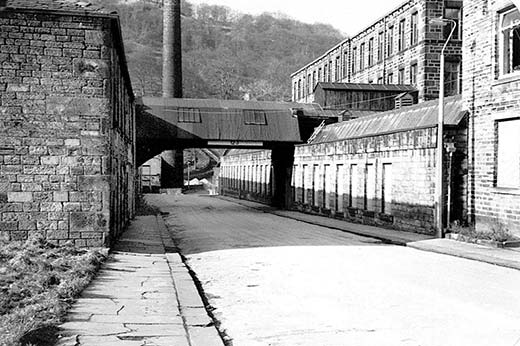Local History Society Report
Memories of Foster Mill
Tuesday, 19 November 2019
A large audience at Hebden Bridge History Society welcomed Allan Stuttard to talk about his memories of his working life in the clothing industry, a period which spanned forty eight years. From his first day he began to learn the unspoken rules, such as where he could or couldn’t sit on the early morning bus from Todmorden or how to distinguish between the bewildering number of ‘Greenwoods’ by their nicknames, as well as the skills of his trade as a pattern cutter. Like many young apprentices, Allan started life as a ‘gofer’, running errands, and making a profit on a sideline of buying in the lunches at nearby Harry Suthers’ pie shop!

At that time, in the 1950s, the clothing industry in Hebden Bridge was booming, with more than 40 different manufacturing units. Redman Brothers, Allan’s employer, had moved into Foster Mill, which was situated close to Victoria Road, and was one of the biggest employers. They specialised in ‘heavy’ cloth such as corduroys, denims, strong tweeds and heavy duty uniforms, including railway uniforms and duffel coats for the navy.
One of the most skilled jobs was pattern cutting, which involved laying out the pattern in the most economic way and then cutting through several layers of cloth using a ‘band knife’. These were a variation of a band saw, produced locally. An atmospheric extract from a film held in the Hebden Bridge History Society archive showed the dangerous operation being carried out with absolute smoothness and confidence. Allan obviously admired the elegant bravery of the band knife operators, who rejected the safety gloves and guards in order to work more efficiently. Despite the danger and disregard of anything approaching modern health and safety regulations, he didn’t recall any bad accidents at work.
The audience also got the chance to see some of the equipment used in the process, examples of the innovation which enabled the company to be a success, such as the perforated patterns and wooden chalk dispenser which allowed intricate patterns to be transferred to the cloth as often as needed.
This spirit of innovation led to changes in the company in the 1960s, moving from ‘making through’ the entire garment to the more efficient (though perhaps less interesting) ‘section work’. Each machinist repeated one of the 40 operations required to make a pair of trousers, and was paid per unit. Redman Brothers continued to fight against the competition from foreign manufacturers, being quick to cash in on fashion trends such as ‘Birmingham bags’ and ‘Beatle jackets’. Allan also recalled that they solved the problem of sewing the rubberised material which gave us the ‘Gannex macs’ .. though he pointed out that the resulting coats didn’t stop people becoming wet from perspiration inside their waterproof shell.
Allan spoke of his lifetime’s work at Foster Mill with affection and humour. He himself was marked out as ‘a promising boy’ and sent on day release to study for City and Guilds qualifications. Eventually, he was promoted to a staff position, ‘crossing the bridge’ as it was known, and he was now allowed to enter the mill through the main door! He evoked a picture of a strong community, with a hierarchical structure and an almost paternalistic management style. They employed their own maintenance staff, on call at any time, and these were provided with cottages close by. Houses on Windsor Road and Windsor Place were rented to employees. When newly married, Allan moved into a house owned by the company, one of the ‘underdwellings’ which he joked to his new wife would have ‘running water… down the walls!’
When the company closed down in 1978, Allan was the last person out, and though he continued to work in the industry, seeing the advent of computerised pattern making, that was a day he remembered with some sadness. He brought to life this time of booming industry and community in Hebden Bridge which clearly fascinated the audience, and left them smiling at the warmth of his many memories.
For anyone wanting to find out more about the heyday of the clothing manufacturing, the society has produced a book called ‘The Clothing Industry in Hebden Bridge’ available through the website through this website.
You can also find here details of the programme for the rest of the year. Talks are held on the second and fourth Wednesdays of the month at Hebden Royd Methodist Church, starting at 7.30 pm. On Wednesday 27th November, Grant Lowe of the National Trust will talk about ‘The Saving of Hardcastle Crags.’ Visitors very welcome.
Details of all the Society’s activities can be found on its website and you can also follow the Facebook page.
With thanks to Sheila Graham for this report
See also


